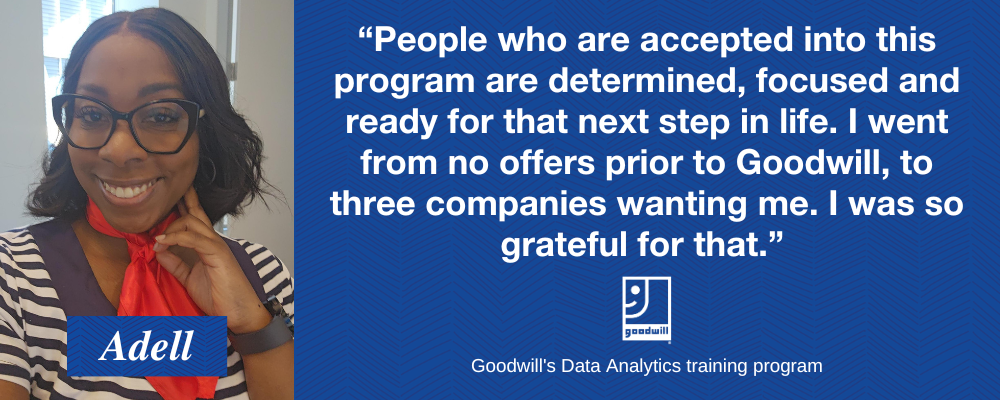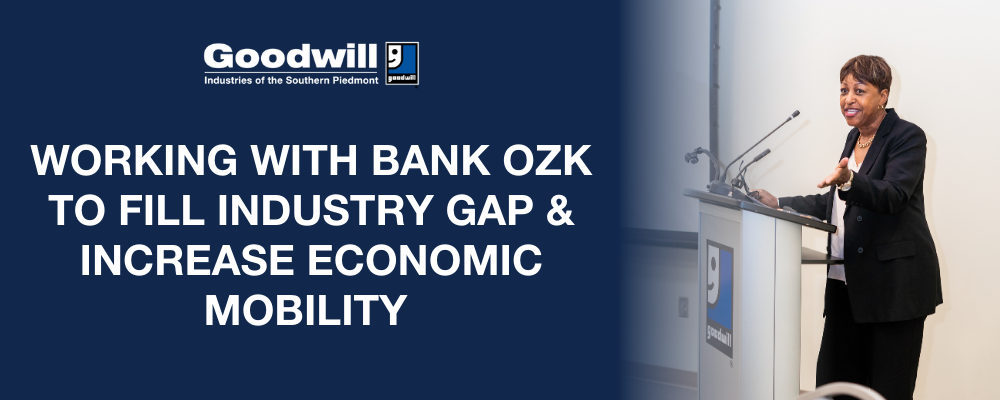 In 2013, only 17.6 percent of persons with a disability were employed. In contrast, the employment-population ratio for those without a disability was 64.0 percent. This staggering discrepancy reveals how much work continues to be needed to help thousands of job seekers with disabilities experience the dignity and independence that accompany a paycheck. As an organization with a longtime commitment to helping people of all backgrounds overcome barriers to employment, Goodwill is honored to help thousands of people earn this self-respect and sense of accomplishment every year. Goodwill provides a variety of programs that assess and identify an individual’s abilities, vocational interests, job readiness skills and training needs. Services are provided by trained vocational coaching specialists who assist workers like Fletcher by providing ongoing support to build success in the workplace. Despite the fact that the United States passed the Americans with Disabilities Act (ADA) more than 20 years ago, Americans with disabilities are no more likely to be employed today than they were before the ADA was enacted. Many of today’s young adults with disabilities have been able to accomplish vital academic and life skills and are ready for work. Additionally, because of breakthroughs, people who are blind or are unable to speak on their own can now use technology to succeed in ways previously only imagined. A recent study reveals that hiring people with intellectual and developmental disabilities doesn’t just improve culture—it improves an employer’s bottom line. The study, which was conducted by the Institute for Corporate Productivity, found that more than three-quarters of employers surveyed ranked their employees with intellectual and developmental disabilities as good or very good on work quality, motivation, engagement, integration with co-workers, dependability, and attendance. How does a proactive employer seek out special needs employees? A great place to begin is simply to contact local organizations that support persons with particular special needs or disabilities. This month Senator Tom Harkin delivered his farewell address to the U.S. Senate after 40 years of public service. An author of the 1990 Americans with Disabilities Act, Harkin has a long-standing history of commitment to people with disabilities. He closed his final speech on the floor with a poignant reminder of the importance of workplace inclusion for all Americans: Let me close with a single word from American sign language that has a powerful message for all of us. Let me teach it to you. (PAUSE to sign “America” in American Sign Language). This is the sign for America. All of us, interconnected, bound together in a single circle of inclusion with no one left out. This is the ideal America toward which we must always aspire.
In 2013, only 17.6 percent of persons with a disability were employed. In contrast, the employment-population ratio for those without a disability was 64.0 percent. This staggering discrepancy reveals how much work continues to be needed to help thousands of job seekers with disabilities experience the dignity and independence that accompany a paycheck. As an organization with a longtime commitment to helping people of all backgrounds overcome barriers to employment, Goodwill is honored to help thousands of people earn this self-respect and sense of accomplishment every year. Goodwill provides a variety of programs that assess and identify an individual’s abilities, vocational interests, job readiness skills and training needs. Services are provided by trained vocational coaching specialists who assist workers like Fletcher by providing ongoing support to build success in the workplace. Despite the fact that the United States passed the Americans with Disabilities Act (ADA) more than 20 years ago, Americans with disabilities are no more likely to be employed today than they were before the ADA was enacted. Many of today’s young adults with disabilities have been able to accomplish vital academic and life skills and are ready for work. Additionally, because of breakthroughs, people who are blind or are unable to speak on their own can now use technology to succeed in ways previously only imagined. A recent study reveals that hiring people with intellectual and developmental disabilities doesn’t just improve culture—it improves an employer’s bottom line. The study, which was conducted by the Institute for Corporate Productivity, found that more than three-quarters of employers surveyed ranked their employees with intellectual and developmental disabilities as good or very good on work quality, motivation, engagement, integration with co-workers, dependability, and attendance. How does a proactive employer seek out special needs employees? A great place to begin is simply to contact local organizations that support persons with particular special needs or disabilities. This month Senator Tom Harkin delivered his farewell address to the U.S. Senate after 40 years of public service. An author of the 1990 Americans with Disabilities Act, Harkin has a long-standing history of commitment to people with disabilities. He closed his final speech on the floor with a poignant reminder of the importance of workplace inclusion for all Americans: Let me close with a single word from American sign language that has a powerful message for all of us. Let me teach it to you. (PAUSE to sign “America” in American Sign Language). This is the sign for America. All of us, interconnected, bound together in a single circle of inclusion with no one left out. This is the ideal America toward which we must always aspire.

What does workplace inclusion mean to you?








Join the Conversation